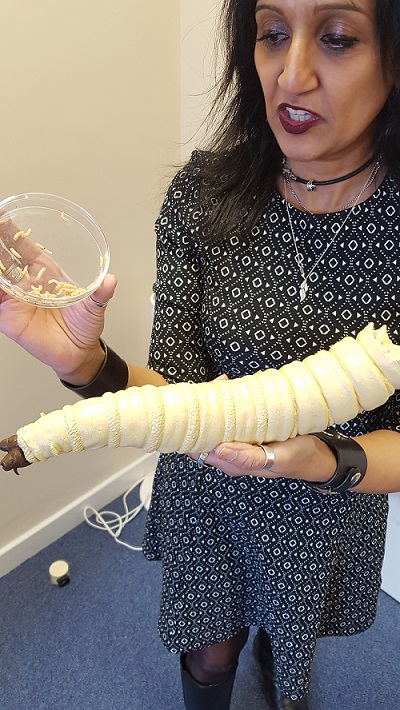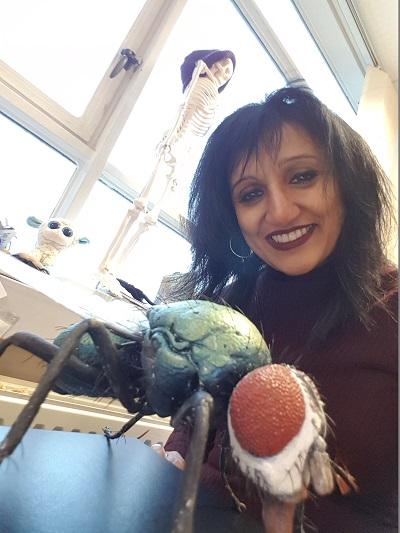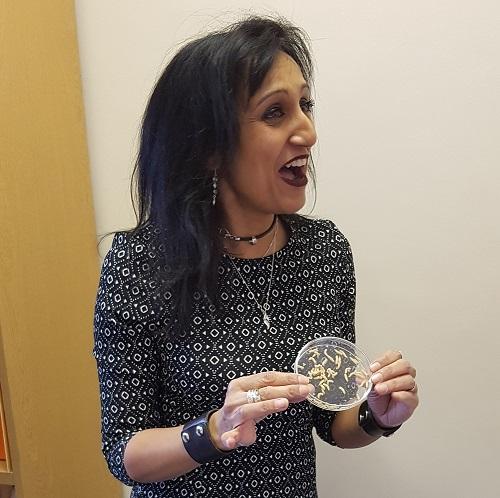Professor Nigam says it was actually a knockback that made her focus on the public perception around her research into maggots.
“As a scientist I spent many years looking at a particular therapy that surged in the United States and the UK in the 80s and 90s. I set up the Swansea University maggot research group in 2001, a group of funded scientists investigating how maggots work in chronic human wounds and how they help to get rid of the dead tissue and promote the healing process.
“One day, I had a grant rejected on the basis that ‘there was little point in investigating the science behind a therapy that no one wanted to use’. And I remember thinking is that true? Would people really not accept maggot therapy if they were offered it for the treatment of their chronic wounds?
“So I decided to investigate this in a bit more detail. In 2015 I was a participant of the Welsh Crucible project and I got together with some psychologists and health improvement fellows and developed a project designed to analyse how people felt about maggots as a wound treatment and whether they would accept them if needed, and if not, why not? What were the fears and associated perceptions?”
She says this inspired her to try and combat the stigma attached to using insects in human medicine.
“It was about the time when public engagement was becoming a really big thing and all researchers were being told they should engage with the public and that their research has to get out there and needs to be relevant to global challenges.
“Most people do not know about the amazing ability of maggots to help heal wounds and there are fears associated with maggot therapy, like ‘the maggots will start eating me alive!’ or, ‘they will turn to flies’ but both of these fears are completely unfounded.
“We wanted to change the negativity and this cultural perception of ‘disgusting maggots’.”
The truth about maggots
Yamni explains that public knowledge is the key to changing public opinion and the only way to do that was through a public campaign.
“First of all we needed to talk about and explain the maggot lifecycle, how they work and that any of the fears people commonly associate with them won’t happen.
“In four days, maggots can do what takes years and years via normal dressings. People start buying into it once they know about it. It’s knowledge that’s crucial to overturning cultural preconceptions.
“That was really the basis of my campaign which took off like mad, everybody wanted me find out more and we were invited to attend all sorts of events.”

TV fame
Due to her campaign Professor Nigam was invited by the producers of the BBC medical drama Casualty to talk to them about putting maggots into the primetime show.
“I was contacted in 2018 by the producers of Casualty, who said they were toying with the idea of using maggots and asked me to come and give a talk.
“I went over to the studio and talked to the scriptwriters and producers all about the public engagement campaign.
“I thought nothing more of it and the next thing I knew they were going to write maggots into four different episodes of the latest series. Over a series of months, I worked with them on the script and we got maggots into the programme, reaching four and a half million people every episode so it certainly raised awareness of maggot therapy.”
The media reaction was mixed, however.
“The Daily Mirror commented online ‘Oh my God, maggots, on Casualty, at tea time’ and I thought, ‘Really? There are plenty of things on Casualty worse than that!’.”

Engaging health professionals
Yamni also said she has had some reluctance from health professionals when trying to get them to try maggot therapy.
“When we decided to target nurses, quite a number said ‘Oh no, I’d rather not put maggots on a wound’ which is understandable, they’re human after all, and subject to the same squeamishness about maggots as the general public.
“Because of that, we decided to target undergraduate nurses in Wales. Now, every single nurse that graduates here will have had maggot education and a two-hour hands-on and interactive session on maggot therapy through Bangor University, The University of South Wales, Cardiff University and of course, Swansea University.”
She said there are lots of real-world medical benefits to researching maggots.
“We’ve identified some amazing molecules from maggots, including a new antibiotic, and a new anti-fungal agent so we know that there’s proper science going on when maggots are placed on wounds. There is still so much that we don’t yet know about, though.
“Knowing about the effectiveness of maggot therapy is key because we are talking about diseases such as diabetes, which give rise to chronic wounds, and that’s increasing in our population and everyone should know that there’s this excellent treatment and excellent therapy out there.”

The next generation
Engaging the next generation is the next step for Professor Nigam and her team as children, she says, have open minds and are not bound by preconceived ideas.
“I’ve now been to schools and talked to children and they absolutely love it. We find when you talk to a three or four year-old about maggots they are enthralled but when you talk to nine or 10 year-olds it begins to change. Somewhere in that period of time they’ve learnt to associate maggots with something disgusting.
“When I have a maggot stand at an event or exhibition, people come up to look and a lot of the time it’s children.
“They will be dragging their parents and grandparents and saying ‘Look at this’ and usually the parents will say, ‘I’m not going near those maggots’.
“When the kids look closer and closer you can see the parents engaging and getting involved saying, ‘Really? Maggots can do that?’. It’s amazing.”
Thanks to Yamni’s work, maggot therapy could now be taught to children at primary school as part of the curriculum in Wales, part of a global challenge of antimicrobial resistance.
Dealing with setbacks
Despite setbacks in her careers, Yamni is philosophical about them, explaining that these have driven her towards future success.
“You must persevere if you love doing what you’re doing because that way, other doors and new opportunities may open. You have to seize all the opportunities you can because you don’t know where they’ll lead to.
“That’s the key message: only ever do something that you absolutely love, that excites you, that drives you, that gives you ambition. If you love something you will do it even if you get knocked back.”
Professor Nigam will share her creative approach to academic research at Advance HE’s new Senior Academic Leadership Programme (SALP) starting in February. SALP provides a unique opportunity for senior academic leaders to discover a range of creative methods for finding new solutions and approaches; increase collaborative engagement to lead transformation in teaching and learning, and research; and explore and refine a clear and resilient sense of their own leadership identity. Find out more and book now.